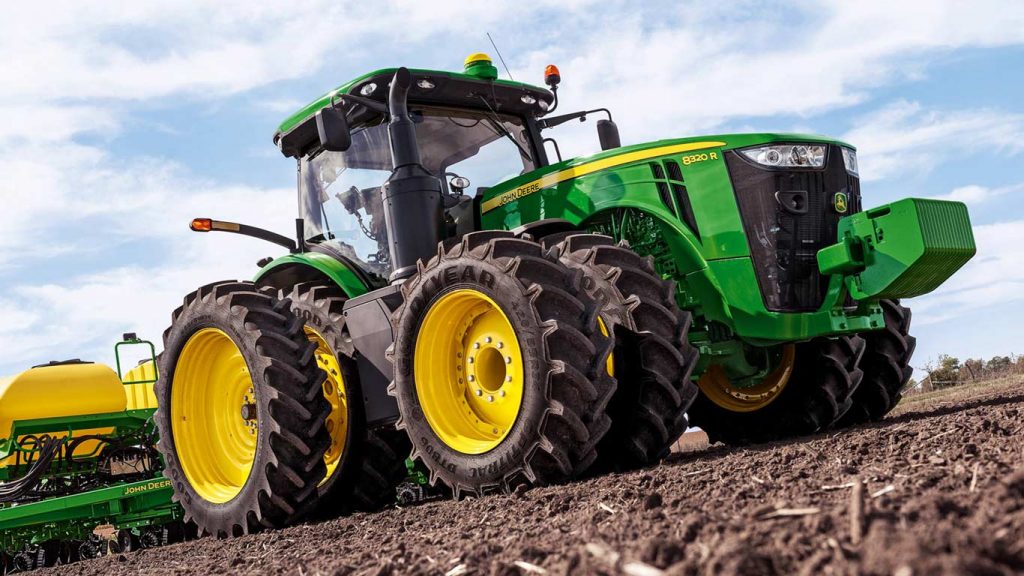The Tractors that Turn Farmers into Hackers

If you’re a farmer, chances are you have at least one tractor. As tools go, these motor vehicles are game-changers, allowing a farmer to plant and plow in a tiny fraction of the time that it would have taken otherwise. As a result, farmers rely on their tractors to an extraordinary degree. And if the tractor breaks down, that’s a problem which needs to be rectified in short order.
Thirty years ago, fixing a broken-down tractor was a relatively simple process — get a new part, install it, and return to work. Rural areas are often dotted with diesel stations anyway, as farmers need somewhere to buy fuel from, and those stations unsurprisingly doubled as repair shops. And given the urgency of the issue, many farmers themselves became informal mechanics, learning the skills necessary to do minor repairs and otherwise keep the tractors in good working order, all without having to visit the diesel station in the first place.
But then came the Internet. And with it, the ability to copy software with ease. That meant you could share your music, download all sorts of computer programs, and even watch a just-released movie in your own home (albeit often in rather low quality). This and similar digital copying caused intellectual property rights holders to flip out, and they demanded Congress take action. In 1998, the Digital Millennium Copyright Act (DMCA) went into effect, which did a lot of things in hopes of making unauthorized copying a little more difficult.
One such change: software now often comes with “digital locks” known as DRM, or Digital Rights Management, which are designed to prevent copying. Unless you break these locks, as law blog Above The Law explains, the DRM may “prevent you from using particular apps on your phone, your printer, or reading an eBook on a different device from the eReader you originally purchased it on.” So why not break the locks? That’s where the DMCA comes in. Depending on one’s interpretation the DMCA, breaking these locks may end up being a copyright violation, even if there’s no other copying going on. It’s weird, it’s complicated, and it shouldn’t really apply to tractors. And yet, it does, because tractor software is DRM protected.
John Deere, a leading manufacturer of tractors, installs software on its tractors which they use to help dealerships and authorized repair places track and manage any changes to the machine. But if you want to make repairs yourself, well, you can’t. The software prevents you from doing so and the DRM prevents you from getting around the software. And without being able to access the software, you can’t complete the repair. Your only choice is to use an authorized shop — and that diesel station nearby probably isn’t one. As one Nebraskan legislator told Popular Mechanics, that’s a big problem: “When you work in farming, you are tied to weather restrictions—planting, harvesting, all have to take place when the weather is holding. When we have an equipment breakdown, sometimes there’s a waiting period to get repairs done. [ . . . ] You’re helpless during that period of time to diagnose, to maintain, or to repair your own equipment as you had in the past. Farmers are falling behind waiting in the queue for someone to work on their equipment.”
So farmers are fighting back. First, they’re filing lawsuits, challenging the application of the DMCA. Second, they’re lobbying state governments as well as the federal government, seeking protection from the DMCA in this fashion. (There’s a growing movement for states to adopt a “right to repair,” for example.) John Deere is challenging those efforts, and they’re slow to come about anyway. Urgency demanded an immediate response. The result: As Motherboard reports, “tractor hacking is growing increasingly popular.”
The Motherboard reporter made his way to an online message board where unauthorized copies of John Deere software are for sale. There, he “found dozens of threads from farmers desperate to fix and modify their own tractors. According to people on the forums and the farmers who use it, much of the software is cracked in Eastern European countries such as Poland and Ukraine and then sold back to farmers in the United States.”
By and large, the solution seems to work — for now at least. Forbes warns that this third-party software may contain malware: “It’s possible infected farm equipment might participate in illegal botnets, or worse, the malware might impact the safety of the operators.” So there is some risk involved. On the other hand, there’s risk at doing nothing. As one farmer using Ukranian software told Motherboard, there’s always a chance that John Deere (or a successor company) will just declare the tractor obsolete. And in that case, he asked, “What happens [then]? Are we supposed to throw the tractor in the garbage, or what?”
Bonus fact: The first commercial Lamborghini s weren’t sports cars. They were tractors. After World War II, entrepreneur Ferruccio Lamborghini recognized the need to automate Italy’s rebooting agricultural sector, so he repurposed parts of Italian military vehicles, now in disuse, for farm work. His tractor manufacturing company, Lamborghini Trattori, opened its doors in 1948. It wasn’t until 15 years later that he started his sports car line. The reason why he got into that line of work? In 1958, flush with money from the tractor business, Ferruccio Lamborghini purchased himself a Ferrari — but was disappointed with the product. He brought his concerns to Enzo Ferrari himself but was rebuffed. In response, Mr. Lamborghini decided to use his tractor engines in automobiles, and from there, the Lamborghini sports car was born.
From the Archives: What You’ve Agreed to… Win?: You know all those software licenses you agree to? Well, sometimes they have surprises. And they’re not always bad.
